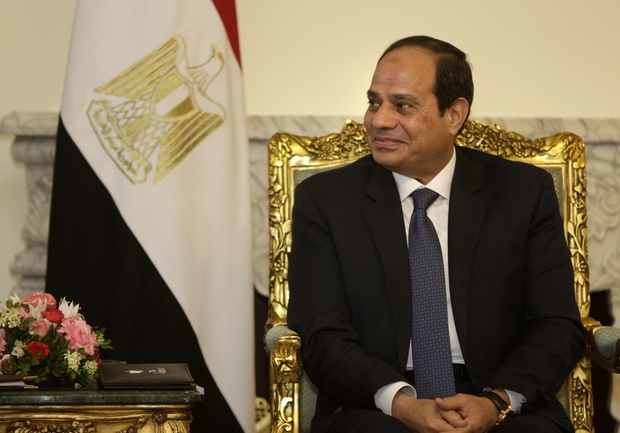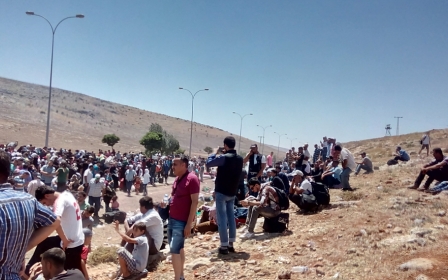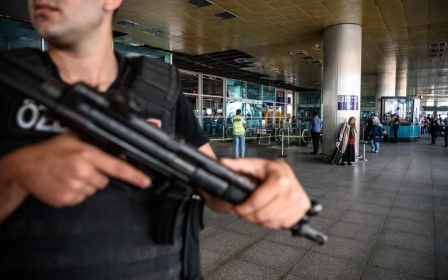Egypt, PKK may be talking for propaganda value: Analysts

ISTANBUL, Turkey – Egyptian overtures to Kurdish rebels engaged in armed conflict with the Turkish government may simply be an attempt to rattle Ankara, analysts told Middle East Eye.
Last week, Turkish newspaper Hurriyet, citing a leaked Turkish intelligence report, said Egyptian officials had met representatives of the outlawed Kurdistan Workers Party (PKK) at least three times since January.
The newspaper report indicates that the Egyptians met representatives from the PKK, and also the Kurdish Communities Union (KCK), a confederation that includes the PKK and the PKK-linked Syrian Kurdish Democratic Union Party (PYD).
According to the report, in exchange for gathering intelligence on and targeting members of Egypt’s outlawed Muslim Brotherhood, many of whom now live in Turkey, Egyptian officials would supply the group with weapons and money – and may have already done so.
After the meetings, the report said, the Egyptians granted approval for the PYD to open a Cairo office.
Hurriyet is the only Turkish media outlet that has directly cited and appeared to have access to the intelligence report, leading some analysts to question its existence and whether the meetings even happened.
However, a senior Turkish intelligence official told MEE this week that the report exists and verified all the details that appeared in Hurriyet’s story, but declined to disclose further information.
MEE asked the Egyptian Foreign Ministry to confirm the meetings and comment, but had not received a response at the time of publication.
Ad-hoc strategy?
The meetings between Egypt and the Kurdish groups, some analysts say, may be nothing more than a wild stab in the dark by Cairo to provoke its Turkish rival.
Turkey and Egypt have been at loggerheads since the ousting of former leader Mohamed Morsi and his government by then-Egyptian army commander Abdel Fattah al-Sisi in July 2013.
Ankara, and Turkish President Recep Tayyip Erdogan in particular, has been vociferous in condemning the coup and refusing to recognise Sisi as the legitimate head of the Egyptian government.
Murat Yesiltas, security studies director at the pro-government think-tank SETA, told MEE he believes the meetings are an ad-hoc decision by Egypt to endear itself to the West and to rattle Ankara.
Both the US and Russia have supported the PYD, the left-wing political group led by Salih Muslim, and its armed wing, the People’s Protection Units (YPG) as they battle the Islamic State (IS) group in Syria.
This support has put the country at odds with Turkey, which considers the group, as it does the PKK, to be a terrorist organisation.
“The Sisi regime just wants to show the Europeans that it is on the same page as the West in the fight against Daesh [IS] and all these meetings with the PYD are mainly due to that,” Yesiltas said.
“I don’t think the Americans are involved at this point. It is just the Sisi regime trying to portray itself as in line with the West,” he said.
“At the same time,” Yesiltas said, “Sisi is trying to send a message to Turkey that Ankara’s continued backing of the Muslim Brotherhood will result in Egypt’s backing of groups like the PKK.”
Lingering doubts
Other analysts remain sceptical over the details of the reported meetings and the motivations of those involved.
Fehim Isik, a veteran columnist who has followed the Kurdish political movement for almost three decades, told MEE that while the PKK would probably not rule out talking with anyone, he thinks the intelligence report is suspect.
“The PKK as a political movement will talk to anyone from anywhere in the world, but I doubt Egypt would be top of the list of their interlocutors,” Isik said.
“But the PKK is an extensive organisation and it could be that an association or body with links to the PKK has been speaking to the Egyptians.”
Muhammed Zahid Gul, an expert on Turkey’s relations with Arab states who writes in various Arabic-language publications, is also sceptical of the report’s authenticity.
Parts of the story don’t make sense to him, and there are not enough details shared publicly to know who was involved in the meetings and at what level they were held, he said.
Although the Hurriyet article only explicitly discussed the PKK and the KCK, Gul said the meetings were held between the Egyptians, PYD leader Salih Muslim and other PYD members.
"As part of the Syrian Democratic Forces meetings in Egypt, it is very normal for [the PYD] to attend," Gul told MEE.
They have been gathering regularly, with the Russians in attendance as well, he said.
Gul also questioned why the Egyptian government would need the PKK to keep tabs on the Muslim Brotherhood in Turkey, given that the Brotherhood is not secretive about its activities there, even broadcasting from its Istanbul-based TV channel.
“The Egyptians also have enough insiders within the Muslim Brotherhood presence in Turkey," Gul said. "They also have plenty of people within the Palestinian and Syrian communities here. Why would they need the PKK for this?”
Divisions between traditionalists and reformists within the Brotherhood are growing, he added. Sisi’s government could exploit that gap much more easily than roping in the PKK.
But a senior Muslim Brotherhood leader based in Istanbul told MEE that the movement is taking the report seriously.
“The PKK has always targeted Islamist groups, and it is no surprise that Sisi would look to employ them to attack us,” Ashraf Abdul Ghaffar said. “The PKK already targets the Turkish government and will not hesitate to attack us.”
Ghaffar said he thinks that even if ties between Turkey and Egypt were repaired, Ankara would not abandon the Muslim Brotherhood and its members in Turkey.
“Turkey might look to restore ties for economic and practical reasons. It doesn’t mean that Ankara will look to expel our members here. We might face some restrictions regarding some activities, but we will not be abandoned,” he said.
Propaganda wars
Some observers said the meetings might be an Egyptian move to create a bargaining chip in case the two countries attempt to reconcile.
The leak came as Ankara has embarked on a process of repairing frayed ties with regional actors. It has reconciled with Israel and is currently in the process of reinstituting ties with Moscow.
“It could very well be part of the ongoing media and propaganda war between the two countries,” Gul said.
Given Saudi Arabia’s good ties with both Ankara and Cairo, together with a rapprochement between Turkey and the United Arab Emirates, one of Sisi’s main backers, it would be unlikely that the Egyptian government would actually support a group directly attacking Turkey, he said.
Yesiltas, however, said that while he believes Ankara would consider improving relations with Cairo, Egyptian attempts to back the PKK in retaliation for Turkey’s support for the Muslim Brotherhood could backfire.
“Yes, Turkey has embarked on a process of repairing relations with other countries,” he said. “But what you have to bear in mind is that Ankara’s objection was to Sisi’s unlawful grabbing of power through a military coup. It wasn’t about supporting the Muslim Brotherhood.”
Any Egyptian assistance to the PKK in terms of finances and arms would have a negligible impact and would not increase the threat of PKK attacks in Turkey, Yesiltas said.
“I don’t know what is driving the Egyptians to court the PKK,” he said, “but whatever their motives, it is a dangerous and not very smart move.”
The crisis between Egypt and Turkey is a political one and has never extended to backing armed opposition, Gul told MEE.
“There is a lot of rhetoric, but neither side has ever backed violent groups in either country,” he said, stressing that if the Sisi government made such a move, it would mark a new level of escalation.
Middle East Eye propose une couverture et une analyse indépendantes et incomparables du Moyen-Orient, de l’Afrique du Nord et d’autres régions du monde. Pour en savoir plus sur la reprise de ce contenu et les frais qui s’appliquent, veuillez remplir ce formulaire [en anglais]. Pour en savoir plus sur MEE, cliquez ici [en anglais].




